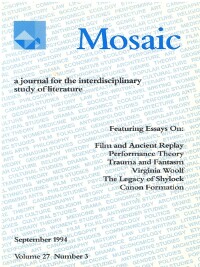Issue 27.3
Overview

General Issue
Published: July 1994
See the issue summary and contents below.
6 essays, totalling 128 pages
$15.00 CAD
This issue of Mosaic opens with a French essay that considers originality as a comparable value of both classic literature and American cinema. The five essays that follow it explore a diverse set of topics: madrigal and lute song production, psychoanalytic readings of The Marquise of O. . . and To the Lighthouse, and the significance of readership in Canadian canon formation.
La conception antique de 1'originalit? et le cin?ma am?ricain contemporain.Pierre-Jacques Dehon A Greek or Latin author was thought to be original if he was able to add a personal stamp when imitating a model. This conception survives in contemporary American movies, as shown by the practice of remakes, the fashion of sequels and series films, and the scenes re-staged in movies. | |
Negotiating Traditions of English Song: Performance, Text, History.Bruce Horner Noting how performance challenges the stability of texts, this essay shows how conventions of English madrigal and lutesong production negotiate the role of performance in the creation of songs and social relations, illustrating the importance of locating the work of art in the interplay between text, performance and history. | |
Rape, Crypt and Fantasm: Kleist's The Marquise of O ?. .Thomas Dutoit The psychoanalytic theory of the traumatic space of mourning and melancholia—the “crypt”—provides a spatial model for reading Kleist’s The Marquise of 0..... In accordance with the theory of an inaccessible, traumatic inclusion, itself hidden in fantasms and memory, the “central” event in the story—impregnation—is depicted as cryptic operation. | |
Love as Destruction in Woolf's, To the Lighthouse.Sheldon Brivic Like Jacques Lacan, Virginia Woolf in To the Lighthouse believes that love always causes harm because it provides a sense of independence based on dependence. Mr. and Mrs. Ramsay destroy each other because they are so devoted; love for her daughter Cam apparently causes Mrs. Ramsay’s death. | |
Breaking the Mosaic Code: Jewish Literature vs. the Law.Michael Greenstein The highly legalistic nature of Judaism in the Five Books of Moses and the Talmud, and the trial of Shylock in The Merchant of Venice impose restrictions on modern Jewish writers. Franz Kafka, S. Y. Agnon, Walter Benjamin, A. M. Klein, Mordecai Richler and Saul Bellow employ a variety of imaginative strategies to contend with the burden of these strictures. | |
Toward a Theory of Cumulative Canon Formation: Readership in English Canada.Steven Tötösy de Zepetnek This essay proposes a theory of cumulative canon formation and of diachronically determined categories of the literary system. Using data about Canadian reading habits, the essay argues that readership is an important index of canon formation. |